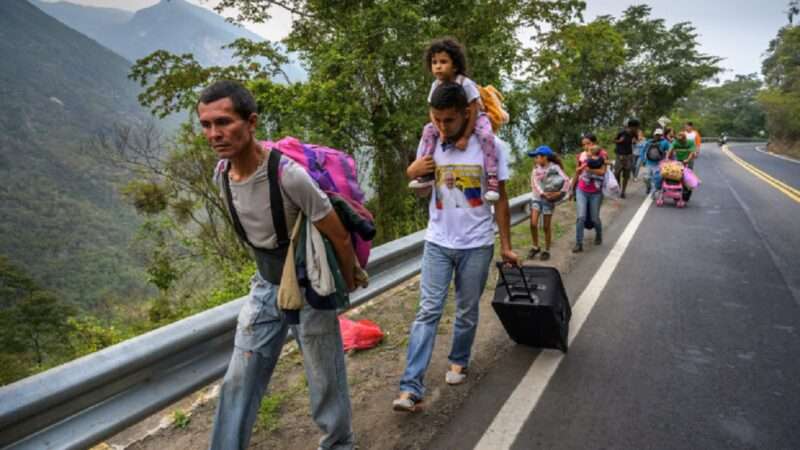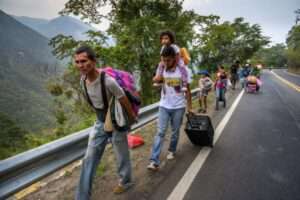

Last week, the Biden Administration Department of Homeland Security temporarily suspended the CNVH (AKA "CHNV") migrant sponsorship program, because of concerns about fraud. In an article for Reason, Cato Institute immigration policy experts David Bier and Alex Nowrasteh explain why this is a terrible decision:
President Joe Biden's Department of Homeland Security (DHS) paused a key component of its immigration agenda last week, which allowed immigrants from Cuba, Haiti, Nicaragua, and Venezuela to enter and work legally in the United States. Known as the CHNV parole process, this program has helped reduce illegal entries by hundreds of thousands since its launch. DHS should restart the CHNV program immediately.
CHNV has provided an important lifeline for migrants fleeing the horrors of totalitarian socialism and communism in Cuba, Nicaragua, and Venezuela, as well as the endemic chaos of Haiti. This process offers a lawful and orderly way for migrants to pursue the American dream. As these countries spiral further into political and economic dysfunction, CHNV has become more important than ever to prevent chaos at the border.
Under the CHNV process, immigrants required sponsorship from U.S. citizens or legal residents to lawfully enter the United States. DHS has halted the program in response to an internal report that allegedly found evidence of sponsor fraud. In fact, all it shows is the agency's anti-fraud directorate's ineptitude at analyzing big data.
Until now, nearly all immigration applications were filed on paper. For the first time in its history, DHS required all CHNV parole applications to be filed online, resulting in a monstrous data file of 2.6 million records. The agency's Fraud and National Security Directorate (FDNS) apparently took its first stab at assessing "potential fraud indicators" within it.
FDNS found blank entry fields, phone numbers that don't work, zip codes that don't exist, strange street addresses, Social Security numbers associated with dead people, repetitive text and repeat filers, and other similar anomalies. FDNS concluded that these issues indicate fraud.
But those oddities and errors are not evidence of fraud—they are part and parcel of large administrative datasets, especially those compiled by the government. Fraud involves intentional deception, deliberate misrepresentation, or omission by applicants to obtain benefits they do not qualify for. These issues are more likely due to changing circumstances between the time when the forms were filed and the FDNS analyzed them, copying-and-pasting between different types of electronic documents, and simple human error.
Finding mistakes like this in big data is absolutely normal. For starters, statistically, some sponsors have certainly died since filing their sponsorship applications. The bigger issue is that when 2.6 million people fill out a form—sometimes on behalf of a relative or client—errors such as transposing numbers and letters, writing their mailing address when they should write their physical address, or mixing up mailing and physical addresses are inevitable.
Errors can be introduced precisely because of the shortcomings of DHS's new online filing system. As one of us learned firsthand when sponsoring someone, DHS's system purges application drafts after 30 days. This means many applicants draft their responses on paper or in a separate electronic format and then paste the responses. This inevitably results in some answers being accidentally duplicated or put in the wrong field. These shortcomings can be easily understood as honest errors instead of fraud.
FDNS also inaccurately interprets repeat applications from sponsors as indicative of fraud. Yet the CHNV parole process explicitly allows sponsoring multiple applicants. Even when all the beneficiaries are from the same family, DHS requires the sponsor to submit separate applications for each person. Of course, there will be repetitive text and repeat filings—DHS mandates it. It's as if FDNS looked for evidence of fraud in the CHNV's data before understanding how CHNV works….
DHS should not overreact to the illusions of fraud inherent in big datasets. Any actual instances of fraud should be addressed through the agency's normal procedures, targeting individual fraudsters or reforming paperwork and electronic filing procedures and audits….
CHNV was the most novel and important part of Biden's immigration agenda. To undermine it now would be a catastrophic mistake that could undermine American border security, reduce the economic gains from immigration, and impose huge humanitarian burdens on migrants fleeing totalitarian socialism in Latin America and the Caribbean.
I would like to take this opportunity to expand on Bier and Nowrasteh's well-taken points a little.
First, as a sponsor in the Uniting for Ukraine program, which is very similar to CHNV and requires largely the same forms, I can testify from personal experience that the submission process can be clunky, and it is easy to make mistakes, especially if you are submitting multiple applications. I warned about this problem early on; in a January 2023 article generally praising U4U, I noted a few shortcomings, including that "[t]he program could… be improved by further simplifying the paperwork, some of which I found confusing and duplicative." My impression is that this flaw has actually gotten worse, as forms have become more complicated over time.
It's important to keep in mind that most would-be sponsors are not lawyers and legal scholars (like me) or immigration policy experts (like Bier and Nowrasteh). Most don't have the same familiarity and comfort level with legalistic bureaucratic forms. Some are recent immigrants themselves. Thus, it's easy for them to make inadvertent errors. That likely accounts for much of what FDNS found here.
Second, Cuba and Venezuela are facing intensifying repression, in the latter case because of the government's to suppress protests against it's recent falsification of election results. Conditions in Haiti and Nicaragua are also awful. It is wrong to close the door to migrants fleeing horrific oppression and violence merely because of flimsy suspicions about fraud by some sponsors (as Bier and Nowrasteh note, DHS has no found no evidence of wrongdoing by the migrants themselves).
Third, as Bier and Nowrasteh note, the CNVH program plays a valuable role in reducing disorder at the border; it could be much more effective if the administration lifted the arbitrarily low 30,000 per month cap on participation (which is the total for all four countries combined). Bier and I expanded on this point in greater detail in a USA Today article. If the Administration wants to keep the number of illegal border crossings down, it should restart CNVH and expand it.
Finally, it's worth emphasizing that CNVH participants, like most other migrants, are an asset to the US, not a burden. They make valuable contributions to our economy, and reduce the federal budget deficit.
I do have one small disagreement with Bier and Nowrasteh: they advocate imposing a $575 fee on CNVH sponsorship applications. I oppose that for reasons explained here, in response to a similar proposal by Daniel Di Martino of the Manhattan Institute:
Social science evidence suggests that even modest bureaucratic obstacles can significantly reduce participation in various programs. Imposing a fee is likely to reduce the number of Americans willing to serve as sponsors, thereby diminishing the benefits of the program. People hate having to do paperwork, and they hate having to pay a fee for the "privilege" of doing it even more. The costs of processing the forms can instead be more than offset by the extra tax revenue produced by parolees who work in the US.
The post Why the Biden Administration Was Wrong to Suspend the CNVH Immigration Parole Program for Migrants From Four Latin American Nations appeared first on Reason.com.







